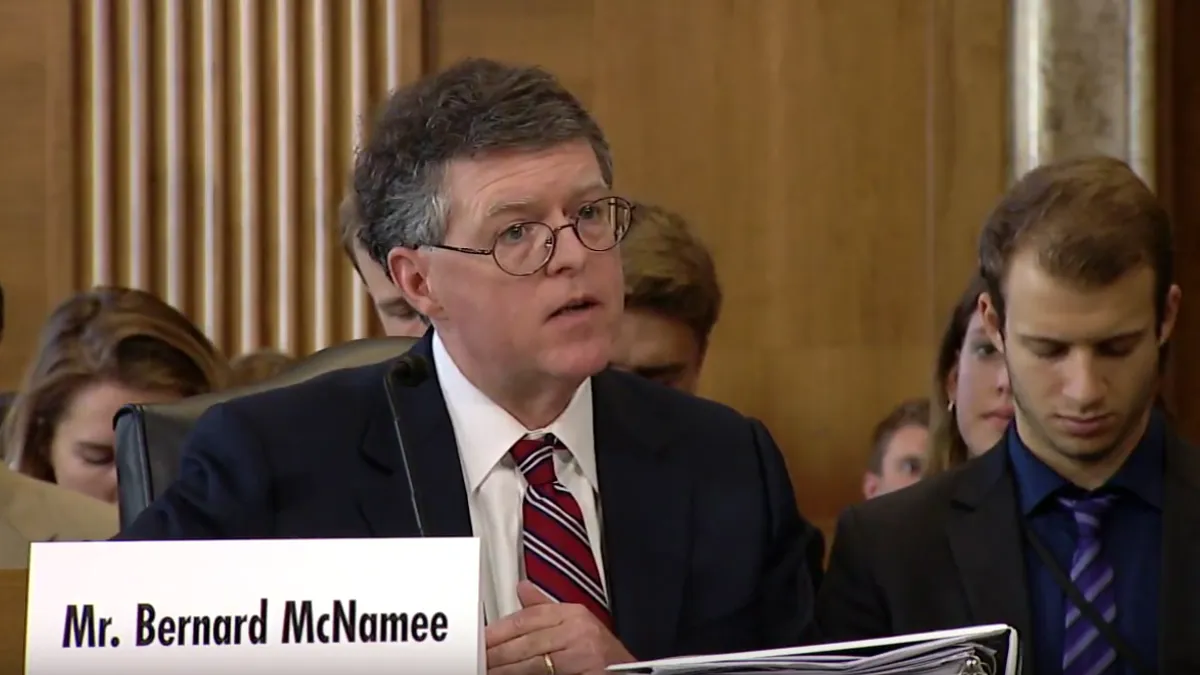Dive Brief:
-
Four environmental groups formally requested on Tuesday that Federal Energy Regulatory Commissioner Bernard McNamee recuse himself from a pending proceeding on grid resilience due to his past involvement crafting coal and nuclear bailout proposals at the Department of Energy.
-
McNamee's work on a DOE cost recovery proposal rejected by FERC and a later bailout plan crafted at the White House show he has "prejudged central matters of law and fact that remain at issue in these proceedings," the Natural Resources Defense Council, Environmental Defense Fund, Sierra Club and Union of Concerned Scientists said in a filing.
-
McNamee criticized NRDC, Sierra Club and EDF by name in a Feb. 2018 speech recently released by Utility Dive, but the groups stress the filing is focused on McNamee's past policy experience and not the filmed comments. If McNamee does not recuse himself, the groups could sue to invalidate outcomes of the proceeding.
Dive Insight:
The environmental groups' filing illustrates continuing controversy over the confirmation of McNamee, previously head of the Office of Policy at DOE.
In that role, the new commissioner helped craft a rule that DOE submitted to FERC last year that would have provided cost recovery to plants with onsite fuel supplies. He also had a hand in designing a later plant bailout proposal based on national security concerns that was reportedly put on hold at the White House this fall.
FERC rejected the DOE's proposal to it in January, opening up a longer term docket to investigate grid resilience, or the ability to bounce back from outages. The environmental groups say McNamee's involvement in that plan and the subsequent White House proposal should disqualify him from participating in the proceeding.
"[A]s a matter of law and independent from any (or lack of) evidence of actual bias, participating both as advocate and as decisionmaker in the same matter poses a constitutionally unacceptable risk of bias," the groups wrote.
FERC's rejection of the DOE plan is still pending rehearing, but the groups said McNamee should recuse himself from that proceeding and the larger docket on grid resilience, writing that they "entail investigation of substantially 'the same facts and issues and of the same parties,' and that is what matters in determining the scope of the required recusal."
The environmental groups are not the first to call for McNamee's recusal. Earlier this month, Senate Democrats asked the commissioner to recuse himself from the resilience docket and "any future matters before FERC that might be characterized as pitting one fuel source against another."
In a federal ethics document dated Oct. 5, McNamee pledges to recuse himself from any matters involving the Texas Public Policy Foundation, one of his former employers, but makes no mention of the Department of Energy, his work on coal and nuclear policy, or the multiple environmental groups he criticized during his February speech.
Some energy lawyers say McNamee's refusal to recuse himself could open the commission to legal challenges on orders that involve a vote from the commissioner. Ari Peskoe, director of the Harvard Electricity Law Initiative, made that argument in a filing at FERC also requesting McNamee sit out resilience issues.
"If I were advising him, I would have recommended a broader look at recusal issues," Peskoe told Utility Dive earlier this month.














